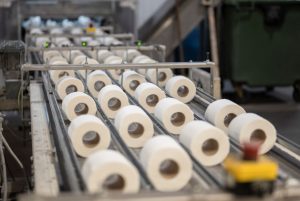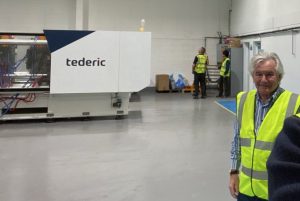Creating brands that we love – the ultimate emotional connection
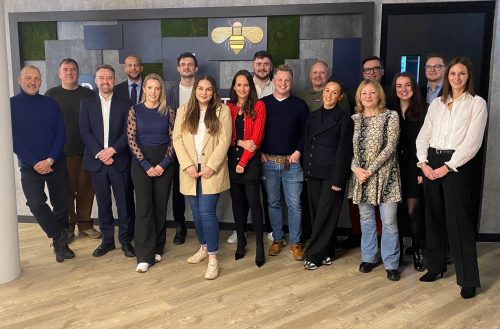
Our round table with our friends at Freeths took time to discuss the importance of creating a brand in achieving business success. How you do it? How do you then sustain it? And what do you have to do in order to protect it. Building on the theory of former Saatchi chief Kevin Roberts around Lovemarks – which score high on two dimensions “love” and “respect” that strengthen consumer-brand relationships and, in turn, positively affect brand loyalty.
Guests generously shared their own examples and experiences of brand building and stewardship.
Martin Carr (The Boardroom, branding consultancy): “You can tell any story you like about the brand. But if the delivery of that brand is in the hands of the team, in whatever way, shape or form, then a large part of the experience is through your people.
“And so the way to get that right is to engage and involve your people in the creation of the brand and the story. There’s no way that you can force that on your people because it has to be authentically true of how they feel, how they behave, what their priorities are, what’s important to them, what their personality is. It’s got to be them on their best day. But it’s got to be authentic to start with. And you get that authenticity by involving people in the process.”
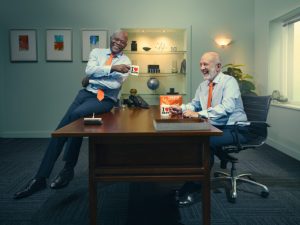
Samuel L Jackson and Jonathan Warburton
Ruth Shearn (RMS): “I agree that authenticity is really important. One of my clients epitomises brilliant branding, Warburtons. The family absolutely cascade their values through the business. Anybody can stick something on the wall. If you don’t live it, you don’t have a brand, you’ve got a nice looking wall.”
Jonathan Mills (MoneyPlus): “We needed to look at this because when I joined MoneyPlus we felt like a stuffy finance firm, or a debt management firm trying to be a financial services firm, when actually what we should have been is something for our customers that was more empathetic and understood their customer journey. So our whole rebranding was focused on trying to gain an authentic, honest, trusting relationship with our consumers.
“I think we’ve got a really good brand that’s landed really well, because it’s different. A lot of the debt management firms have just one persona, whereas we try and be a little bit more realistic and our mantra is that we help people to live better. So we’ve been working on trying to help customers to improve their lives holistically, rather than just focusing on what we actually deliver as a service.”
Charlie Benson (WeDo Business Services): “It is very difficult to differentiate. We have an HR offering, that is exactly what you’d expect from outsourced HR. Same with finance, it’s finance, there are little things that differentiate us; we charge one fee that is transparent, and you don’t get caught by hidden fees. That’s core to our values and it’s important for us to be transparent.
“A big thing for was ‘how can we show these things and not tell them?’ So rather than saying, ‘we’re great to work with’ that isn’t the visual articulation of the brand? Part of it is in the tone of voice, the way things are said. So you can say we’re super approachable, and we’re experts. But can you say that in a friendly way?
“We started in 2019. So it’s still relatively new, but the reason we’re rebranding is we started out as just finance. And then all the other business services have been added on.”
Joe Taylor (Real Handful): “We started as a trail mix company, we’ve been doing fruit and nuts, and now it’s a bit of a dusty category in supermarkets and not particularly exciting. When we launched in 2016, we invested quite a lot into our brand.
“COVID kind of caused us to have to pivot in 2020 so we now focus more on kind of the savoury snacking, and we’ve tried to evolve our brand much more into that kind of challenge or position through product, but through distinct innovation on format and pushing ourselves to change the product.
“I think a lot of it is about the rituals and habits that you have around food and drink and these kinds of products that you interact with, so that’s an area where we’re thinking about.”
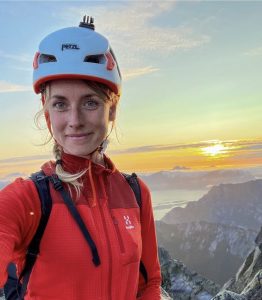
Rock climber Matilda Soderland in Haglofs gear
Neil Summers (Haglofs, Dometic, Eddie Bauer): “I work with outdoor brands and one of them, Haglofs, is uncompromisingly Swedish and the tagline is ‘outside by nature’.
“The Swedes just love the outdoors. It’s not a fad like it is in the UK, where kids are wearing outdoor right now, but for the Swedes it’s a mandatory thing everyone does. Their products are all tested in the Nordics and so that authenticity is tested because if they fail then people might get hypothermia and die. It’s a very ‘proof is in the pudding’ issue, which makes my job of promoting it quite easy, really, because it’s a great product. I’ve just got to make more people aware of it.”
Will Stone (Alliance Manchester Business School): “We’re going through a rebranding and the process has been really interesting because we’ve got academics, students, professional services who all value some things more than others. So language is really important, as is the culture and values. And I would say the key thing, is to keep it simple. There’s so much in a brand. Everybody’s an ambassador.”
Nina Sawetz (Future PR): “I handle the reputations of the CEOs behind the company. When any new business approaches me and wants to work with me, the first thing I do is look at their CEO, I’ve got their Facebook and Twitter, I go all the way back, I see if what they’re talking about matches their company, because there’s so many occasions where it just doesn’t at all.
““I’m on a bandwagon at the moment about the concept of personal branding. How a CEO reflects themselves has been completely hijacked into just thinking about that individual themselves and their own life and maybe what they’re going through or what, how they’re waking up in the morning at 5am.
“It’s actually about how that person reflects on their company, if that person is slagging off Manchester, but then wants to win more investment into Manchester. That is not going to work. And that’s where I’ve had to step in and say, stop it. I can’t tell you the amount of times I’ve phoned up clients and said, you need to take that tweet down now. Because if you want to sabotage your own business, which you’ve worked so hard for, you need to take that tweet down or don’t tweet that, or don’t talk about that. I actually tell my clients ‘no’ far more than I tell them ‘yes’.”
Jack Cairns (Salford Red Devils Rugby League Club): “Rugby League is on the cusp of something really special and img (sports marketing agency) are leading a 12 year strategic partnership to take the game from where it is to where it could be. It was left behind by Rugby Union decades ago when really, without being biased, League is the better of the two games.
“With our name we’ve aligned ourselves in the shadow of a sizable institution 15 minutes down the road. But we can’t be too derogatory towards Manchester United because we’ve got a massive overlap between the season ticket holders. The attendance property dips around 8-t 12% on match days if it clashes with United games. So this year, we decided to go along with the tagline of the original Red Devils. So that’s that’s the way that we’re going.”
David Blake (Club de Padel): “We’ve only been open for six weeks, but we’re underneath the towers at Deansgate Square, which is obviously a fantastic location because we’ve got 5000 People looking literally down at us.
“From a brand perspective, the way we approached it was to present Padel as a very sociable and inclusive sport, going back to the heritage of the brand. And we want it to be slightly more retro and a little bit soft. And for our club we’re in the city centre and we wanted to represent and speak to the demographics of the city centre.”
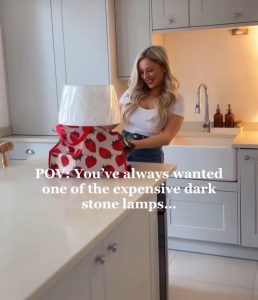
Customer content from The Range
Julia Mitchell (Toast PR): “One of the brands we work with is a value retailer called The Range.
“They were struggling a bit to differentiate themselves from all the competition but it was the user generated content that nailed it for them. They’ve got customers who are quite tribal. When they like one of those brands, they really like one of those brands, and then take to social media to say so. They’ll often show themselves in a store, picking items out and then going home with it. It is really authentic and genuine. So we were able to corral some of that content and start putting that out, which those customers loved because they suddenly got famous, and then it just it mushroomed from there. And that’s been brilliant. And you talk about leaders being important, to the brand, obviously customers are as well. But if you can get real, authentic content like that, from customers, it’s just worth its weight in gold.”
Ruqaiyah Hafeji-Iqbal (North Care NHS Charity): “We have a unique challenge in that we are and NHS trust’s charity, in that we have our own funding, and we don’t use the NHS lozenge or anything like that on our brand. RMS have created a fantastic brand for us. And we have invested a lot of time in our visual identity, trying to connect to the local community. We don’t just want to keep creating pretty walls and things that look good but we want to make it mean something to us.”
Laura Tracey (employment partner, Freeths): “We all know that if you’ve got a happy workforce and an engaged workforce, then they’re going to do more work, they’re going to have more purpose, they’re going to stay with you longer and they’re going to talk about your brand and your organisation in positive terms.
“But I think treating your staff well encompasses a broad amount of things. And the expectations on you, as an employer, are much greater than they used to be where people just wanted a job that paid the bills.
“Now, a lot of people are looking for the organisations they work for to have a purpose and ask if their values are aligned. They ask, what’s your environmental impact? And do I agree with that? Are you an inclusive employer? And how do you demonstrate that? So I think if you’re an employer who’s trying to improve and grow your brand, you should also be thinking about the employee journey. From the language that you’re using, when you’re recruiting. What is that saying? And how is that consistent with your language to your customers, and to your clients? And then they have an interview with you, what is that experience like?
“There’s a lot you can do. I think it’s about how to live those values throughout the whole employee experience, and even when people leave. Do you push them out the door? Or do you sit down and say, thanks for everything you’ve done for us, you did really well, come back any time. If you do, they’re a lot less likely to slag you off on Glassdoor when they leave.”
Simon Barker (partner, Freeths): “We’re building a brand just like everybody else in legal services. Certainly lawyers do things in a kind of vanilla way, you know, this is a particular problem, you deal with it like this, and there’s only one real fixed way. But actually, I think, where we are different is one of our brand values, which is ‘free thinking’. We have to align with that in how we go about delivering our legal services for our for our clients.”



